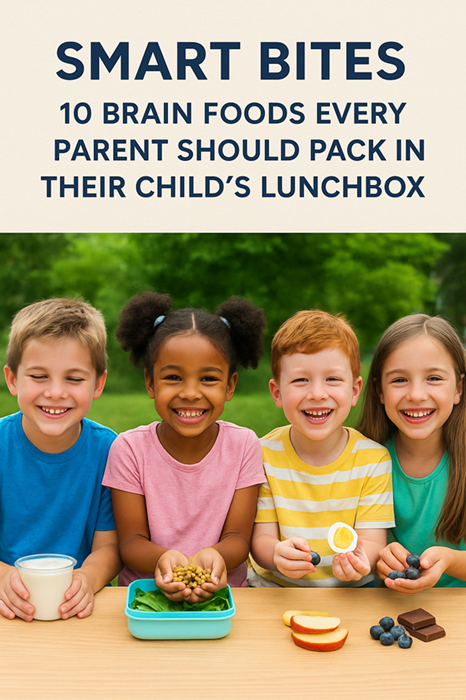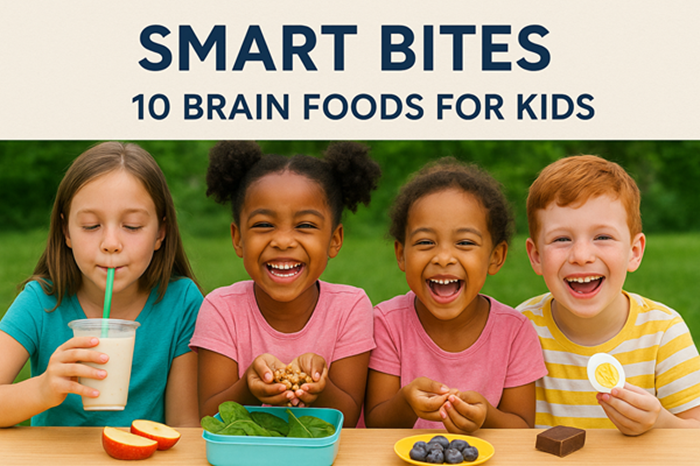Every parent wants their child to thrive—academically and emotionally. While routines and encouragement matter, did you know that what children eat directly impacts their brain function? Research shows that the right nutrients help boost focus, support memory, and enhance learning for growing minds.
Today, let’s explore 10 powerhouse foods to pack in your child’s lunchbox—each supported by credible research and ready-made for easy, healthy parenting.

10 Brain Boosting Foods to Pack in Your Child Lunchbox Are :
1. Walnuts – Omega-3 Power for Brain Growth
Benefits:
Walnuts are rich in omega-3 fatty acids, especially DHA, which promotes neuron growth and enhances connections between brain cells. Dr. David Perlmutter explains that DHA “turns on the brain’s ‘growth hormone’ (BDNF), promotes neuroplasticity, and acts as an anti-inflammatory”.
Lunchbox Tip:
Add crushed walnuts to yogurt, trail mix, or cereal mixes.
2. Eggs – Choline-Rich Brain Builder
Benefits:
Eggs are a top source of choline, a nutrient crucial for producing acetylcholine, a neurotransmitter that supports memory and attention. Plus, eggs deliver high-quality protein to fuel focus throughout the day.
Lunchbox Tip:
Pack boiled eggs, mini omelets wrapped in roti, or egg salad sandwiches on whole grain bread.
3. Blueberries – Antioxidant Memory Boosters
Benefits:
Blueberries contain flavonoid compounds known to support memory and brain health. One Harvard Health study found that people with high flavonoid intake were 19% less likely to report memory issues .
Lunchbox Tip:
Pack them fresh, toss in fruit skewers, or add to yogurt.
4. Oats – Slow Energy for Sustained Focus
Benefits:
Oats are rich in complex carbs and fiber, providing a slow energy release to the brain—helpful during long morning sessions. They’re also a good source of B-vitamins and iron, which support cognitive function.
Lunchbox Tip:
Include banana-oat muffins, oatmeal bars, or oat chillas.
5. Spinach – Iron & Antioxidants for Alertness
Benefits:
Spinach is rich in iron, magnesium, folate, and vitamin K—nutrients that help produce new brain cells and carry oxygen to the brain. Iron, especially, combats fatigue and enhances alertness.
Lunchbox Tip:
Use spinach in wraps, frittatas, pasta, or mini parathas.
6. Pumpkin Seeds – Zinc-Rich Focus Enhancers
Benefits:
Pumpkin seeds are packed with zinc, magnesium, and iron, vital for mood regulation and cognitive development. Zinc deficiency is linked to learning and attention issues in kids.
Lunchbox Tip:
Roast with a light seasoning or mix into trail snack.
7. Greek Yogurt – Probiotics & Protein Combo
Benefits:
Greek yogurt provides probiotics that promote gut health—and research shows a strong gut-brain connection influencing mood and focus. The high protein content also sustains energy levels.
Lunchbox Tip:
Layer yogurt with fruit or swirl in honey and chia seeds.
8. Apples – Crunchy Vitamin Boosters
Benefits:
Apples are rich in quercetin, an antioxidant that supports blood flow to the brain and protects against cell damage. They also provide steady energy without sugar spikes.
Lunchbox Tip:
Slice with a hit of lemon to prevent browning and pack with nut butter.
9. Carrots – Vitamin-A Rich Brain Fuel
Benefits:
Carrots offer beta-carotene, which converts to vitamin A—essential for brain communication and vision. These nutrients also support gene expression linked to cognitive functions.
Lunchbox Tip:
Include sticks with hummus or add to wraps and salads.
10. Dark Chocolate – Flavonoid Treat for Focus
Benefits:
Flavonoids in dark chocolate support blood flow to the brain, memory, and mood. While moderation is key, a small piece (70% cacao) can be a brain-boosting treat.
Lunchbox Tip:
Use small dark chocolate squares in a balanced trail mix.
What to Avoid
To maximize brain benefits, steer clear of:
- Excessive sugar (candies, packaged juice)
- Processed snacks (chips, instant noodles)
- White bread & refined grains
Why Brain Foods Matter
I’ve seen the difference firsthand: when my child’s lunchbox is filled with these brain-boosting foods, she’s more focused, less cranky, and excited to learn. Science backs this up—nutrients like omega-3s, B vitamins, and antioxidants are essential for growing brains, supporting everything from memory to mood
Sample Weekly Brain-Boosting Lunchbox Plan
| Day | Main Course | Snack | Drink |
|---|---|---|---|
| Monday | Spinach-egg wrap | Blueberries + Greek yogurt | Coconut water |
| Tuesday | Oat-chilla + carrot sticks | Apple slices + nut butter | Lemon water |
| Wednesday | Whole grain pasta + veggies | Walnuts + dark chocolate | Buttermilk |
| Thursday | Spinach paratha + cheese | Pumpkin seeds & fruit mix | Smoothie |
| Friday | Veggie pulao + salad | Greek yogurt + berries | Fresh lime water |
A Personal Note from One Parent to Another
I understand the daily juggle—balancing nutrition, academics, and picky tastes. Some days, lunchboxes come back untouched. Other days, it’s a triumphant clean slate. What matters most is consistent effort, not perfection. Even adding one brain food at a time—more walnuts today, spinach tomorrow—is a step toward lifelong healthy habits.
Remember: You’re not just packing lunch; you’re nurturing their mind, body, and future. Let’s keep doing this together—one mindful bite at a time.
These cause energy crashes and distract from focus.
FAQ – Brain Foods for Kids’ Concentration & Focus
1. What foods help improve a child’s concentration at school?
Foods rich in omega-3s, iron, zinc, and antioxidants help sharpen focus. Top examples include walnuts, eggs, spinach, blueberries, oats, and Greek yogurt. These support memory, brain cell development, and sustained energy.
2. How does food affect brain development in children?
A child’s brain needs the right nutrients to grow, build neural pathways, and function properly. Nutrients like choline, DHA, iron, and antioxidants fuel cognitive processes, enhance memory, and regulate mood.
3. Are processed snacks harmful to brain development?
Yes. Highly processed foods with excess sugar and refined carbs can lead to energy crashes, mood swings, and reduced attention span. It’s best to replace them with whole, nutrient-rich alternatives.
4. How can I add brain foods to my child’s lunchbox without complaints?
Try creative approaches like:
- Mixing blueberries into yogurt
- Making egg-and-spinach wraps
- Using dark chocolate in homemade trail mix
- Packing colorful veggie skewers
Involve kids in planning to increase acceptance.
5. Can my child eat these brain foods every day?
Absolutely! These foods are natural and safe for daily consumption in moderate portions. Rotating them throughout the week keeps lunchboxes exciting and nutritionally balanced.
6. Are vegetarian brain foods as effective as non-veg ones?
Yes. Walnuts, flaxseeds, spinach, oats, pumpkin seeds, and fruits like berries offer similar benefits. They supply omega-3s, iron, B-vitamins, and antioxidants necessary for healthy brain development.
7. What drinks support brain health for kids?
Hydration is crucial. Coconut water, buttermilk, smoothies with berries, or lemon water are great options. Avoid sugary juices and sodas.
8. At what age should I start giving brain foods to my child?
You can introduce brain-friendly foods as early as toddlerhood (1–2 years), in age-appropriate forms. Early nutrition lays the foundation for cognitive and emotional development.
9. Are there any foods that actually worsen concentration?
Yes. Excess sugar, trans fats (like in packaged chips or fried items), and artificial food colors have been linked to poor focus, hyperactivity, and mood issues in children.
10. How do I know if my child is getting enough brain nutrients?
Look for signs like good energy levels, consistent focus, improved memory, and stable mood. A pediatric nutritionist can also help assess and fine-tune your child’s diet.
Read about 10 Foods That Are Harming Your Kid’s Brain Health
Read about Back to School After Summer Break: 10 Things Every Parent Should Do First
Read about How to Reduce Screen Time for Kids Without Stress: A Friendly Parent’s Guide
Read about Monsoon and School Reopening: A Complete Guide to Keeping Kids (LKG to 5th) Healthy & Happy
Read more about Healthy Brain and Child Development (HBCD) Study

Hi, I’m Prashant Jain — a curious soul, storyteller, and content creator at heart.I’ve always been drawn to the world of entertainment, travel, sports, health & lifestyle — not just as a writer, but as someone who genuinely lives these experiences. Whether I’m binge-watching the latest OTT series, exploring offbeat spiritual destinations in India, or diving deep into wellness routines and cricket match insights, I love sharing what I discover with like-minded readers.
PopNewsBlend is my way of blending personal journeys with meaningful stories — ones that inform, inspire, and keep you ahead of the curve. Everything I write comes from real observations, hands-on experiences, and a deep passion for understanding the world around us.
Discover more from Popnewsblend
Subscribe to get the latest posts sent to your email.








The suggestions are not only nutritionally sound but also convenient for busy parents. Including items like berries and nuts makes it easier to prepare healthy lunches without much hassle.
Extremely Helpful!! Great roundup! Brain development in kids is such an important topic, and I love how you’ve highlighted accessible, nutritious options. Definitely sharing this with a few parents I know – thanks for putting this together!
Pingback: Common Diseases in Kids During Monsoon: Symptoms, Prevention & Parent Tips
Pingback: 10 Gentle Parenting Secrets to Raise Kind, Respectful, and Well-Behaved Kids
Pingback: Can Soft Drinks Stunt Your Child’s Growth? Expert Insights
Pingback: Top 10 Health & Fitness Trends of 2025